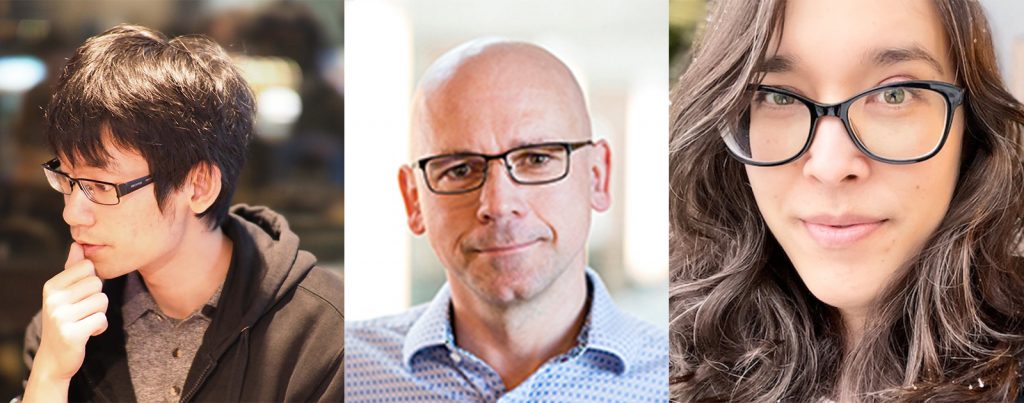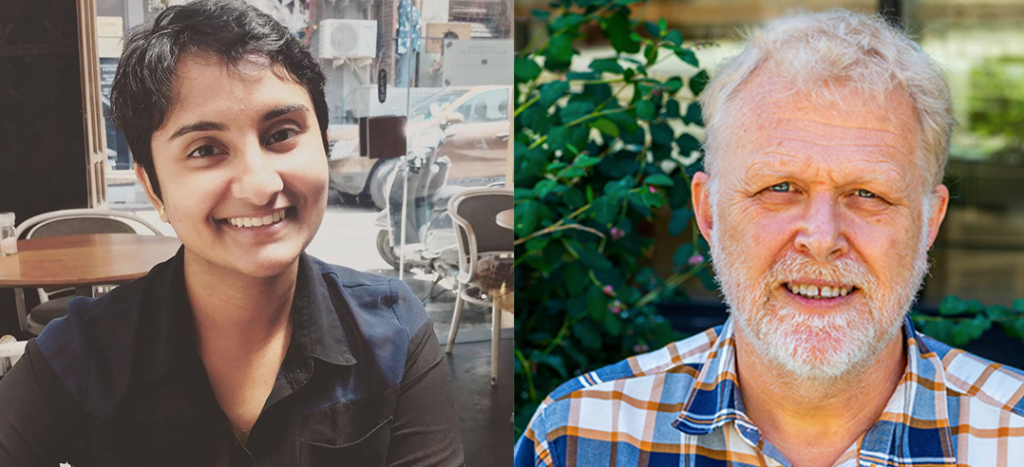Researchers at the University of Washington contributed to four Best Papers and 11 Best Paper Honorable Mentions at the recent Conference on Human Factors in Computing Systems (CHI 2021) organized by the Association for Computing Machinery. The virtual conference offered UW researchers the opportunity to showcase the breadth and depth of their expertise in human-computer interaction (HCI) and design as well as the strength of interdisciplinary collaborations such as DUB. Members of the Allen School co-authored two of the Best Papers and eight of the papers recognized with Honorable Mentions.
In addition to the papers, Allen School professor Jeffrey Heer, director of the Interactive Data Lab, was inducted into the CHI Academy for his substantial, cumulative contributions to the field of human-computer interaction, social computing and data visualization. He is one of only eight new members elected to the Academy this year.

Allen School Ph.D. student Chenglong Wang and professor Rastislav Bodik of the Programming Languages & Software Engineering (PLSE) group and iSchool professor and Allen School adjunct professor Amy J. Ko, co-authored the award-winning paper, “Falx: Synthesis-Powered Visualization Authoring,” with professors Yu Feng at the University of California Santa Barbara and Isil Dilig at the University of Texas, Austin and former Allen School professor Alvin Cheung, now a faculty member at the University of California, Berkeley. In the publication, the team introduces Falx, a tool that enables data analysts to create data visualizations more easily through demonstrations. While modern visualization tools make data visualization design easier, when it comes to exploratory visualization, there can often be a mismatch of data layout and design that requires significant effort. Falx addresses the issue by automatically inferring the visualization specification and transforming the data to match the design from user demonstrations.

Allen School Ph.D. student Naveena Karusala and professor Richard Anderson of the Information and Communication for Technology Development (ICTD) Lab co-authored ‘‘’That courage to encourage’: Participation and Aspirations in Chat-based Peer Support for Youth Living with HIV” with UW Global Health professors Brandon Guthrie, Grace John-Stewart and Keshet Ronen; professor Megan A. Moreno at the University of Wisconsin, Madison; and Kenyatta National Hospital researchers David Odhiambo Seeh, who is also a research assistant at UW, Cyrus Mugo and Irene Inwani. For their award-winning paper, the team conducted a qualitative study of WhatsApp-based facilitated peer support groups for youth living with HIV in Nairobi, Kenya. While chat apps can make patient-provider communication and peer support more accessible outside of clinical settings, the experience of participants in such group chats in areas where phone sharing and intermittent data access are common is understudied. Using a combination of chat records and interviews with participants, the researchers found that the youth in the chat groups were motivated by newfound aspirations and a sense of community to manage their health despite the complexities of group dynamics, intermittent participation, and concerns about privacy. The paper offers takeaways for participation and privacy in chat-based health communities and how the role of aspirations can be factored into the design of health interventions.
In addition to the two award-winning papers, Allen School researchers contributed to eight papers that earned Honorable Mentions for addressing topics such as medical making during a pandemic, remote collaboration and communication, the impact of prison surveillance, and more:
“Do Cross-Cultural Differences in Visual Attention Patterns Affect Search Efficiency on Websites?” by Allen School Ph.D. students Amanda Baughan and Tal August, professor Katharina Reinecke, postdoctoral researcher Nigini Oliveira and researcher Naomi Yamashita of Nippon Telegraph and Telephone Corporation explored the differences between the way Westerners and people in East Asian societies — U.S. and Japanese citizens, specifically — absorb contextual information online and the implications of their findings for website design.
“Medical Maker Response to COVID-19: Distributed Manufacturing Infrastructure for Stop Gap Protective Equipment,” co-authored by professor Jennifer Mankoff and Ph.D. student Kelly Mack of the Allen School’s Make4All Lab, Georgia Institute of Technology professor Rosa Arriaga and Ph.D. student Udaya Lakshmi, and Carnegie Mellon University professor Scott Hudson and graduate student Megan Hofmann, assesses the efforts of medical makers to organize stopgap manufacturing capabilities to address acute and chronic shortages of personal protective equipment (PPE) during the pandemic to inform future infrastructure design that will enable community production of safe devices at scale.
The same team also contributed to “The Right to Help and the Right Help: Fostering and Regulating Collective Action in a Medical Making Reaction to COVID-19,” which explores the tension between the medical field’s “do no harm” ethos and maker communities’ desire to rapidly innovate in response to shortages of PPE. To address this tension and strike a balance between action-oriented and regulated practices, the researchers recommend that regulatory bodies build coalitions with makers, online platforms give communities more control over the presentation of information, and repositories to balance the need to distribute information while limiting the spread of misinformation.
“Scraps: Enabling Contextual Mobile Capture, Contextualization, and Use of Document Resources,” co-authored by Allen School alumna Amanda Swearngin (Ph.D., ‘19), now an engineer at Apple, and Microsoft researchers Shamsi Iqbal, Victor Poznanski, Mark Encarnación, Paul Bennett and Jaime Teevan, presents an app that makes it easy for people to capture and add context to information from their phone and later link that information to a document on their desktop.
Allen School Ph.D. student Chunjong Park is one of the researchers behind another app “Significant Otter: Understanding the Role of Biosignals in Communication,” co-authored by Carnegie Mellon University professors Laura Dabbish and Geoff Kaufman and Snap, Inc. researchers Fannie Liu, Yu Jiang Tham and Tsung-Yu Tsai. Significant Otter is an Apple Watch/iPhone app with animated otter avatars that enables romantic partners to share and respond to each other’s biosignals to create a more authentic communication that fosters social connection.
Allen School Ph.D. student Ruotong Wang co-authored “Tabletop Games in the Age of Remote Collaboration: Design Opportunities for a Socially Connected Game Experience” with University of Minnesota professor Svetlana Yarosh and Ph.D. student Irene Ye Yuan and Northwestern Ph.D. student Jan Cao. The paper examines how people adapted existing technologies and their offline practices in pursuit of a shared tabletop gaming experience in the context of the pandemic. The team also reflects on challenges and opportunities for designing a better communal gaming experience in the age of remote collaboration.
“What Do We Mean by ‘Accessibility Research’? A Systematic Review of Accessibility Papers in CHI and ASSETS from 1994 to 2019,” by Kelly Mack, professor Jon Froehlich and Ph.D. student Dhruv Jain in the Allen School’s Makeability Lab; UW Human Centered Design & Engineering professor Leah Findlater and graduate student Emma McDonnell and Allen Institute for Artificial Intelligence researcher Lucy Lu Wang, reflects on gaps in accessibility research presented at CHI and the International ACM SIGACCESS Conference on Computers and Accessibility (ASSETS) over a 25-year period and offers guidance for future work in the field.
You Gotta Watch What You Say”: Surveillance of Communication with Incarcerated People, by Allen School Ph.D. student Kentrell Owens, alumna Camille Cobb (Ph.D., ‘19), now a postdoc at Carnegie Mellon University, and CMU professor Lorrie Cranor examines the impact of third-party surveillance of communications between families and relatives who are in prison. Using semi-structured interviews, the team explored the implications of family members’ inaccurate understanding of surveillance and the misalignment of incentives between end-users and vendors to enhance ongoing conversations around carceral justice and the need for more privacy-sensitive communication tools.
All told, UW authors contributed a total of 50 papers presented at this year’s conference. See the complete list of UW CHI papers here.


